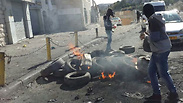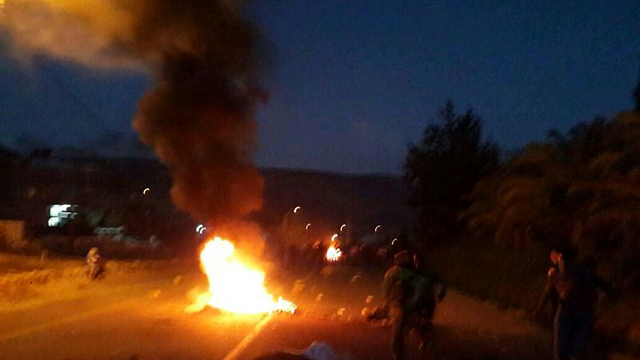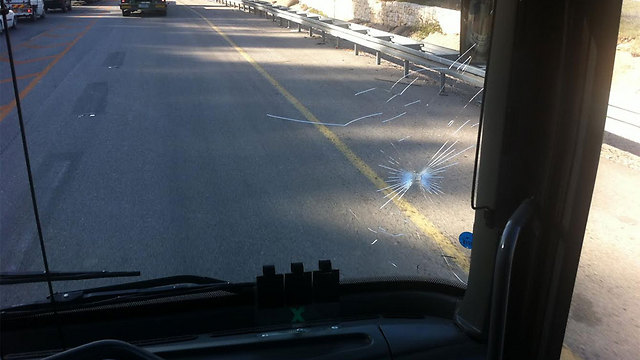
Police blame violence on rightwing MKs' Temple Mount visit
Day after police shoot Arab youth, further fueling violence in Israel, top police source claims incitement, provocation feeding situations; clashes in north, Jerusalem, continue.
"Repeated attempts by members of Knesset to reach the Temple Mount is a provocation that incites Palestinians' to respond and significantly and unequivocally increases tensions in the Temple Mount and the capital," a senior police official told Ynet as clashes between security forces and Arabs and Palestinians continued.
Israeli police went on heightened alert Sunday following protests across the country over the fatal shooting of a 22-year-old Arab Israeli who appeared in video footage to be retreating from police, Prime Minister Netanyahu vowed a tough response to any further unrest.
Thousands of Arabs took to the streets Saturday to protest the shooting, with many hurling rocks and firebombs at police. The protests continued Sunday with a general strike called by Arab Israeli community leaders and demonstrations outside universities and other institutions, and massive clashes throughout Israel.
Over 25 people, including youth as young as 12, were arrested in Kfar Kanna, the scene of the fatal shooting of Khair Hamdan, while thirty youths set tires on fire at a central junction in Nazareth. Dozens of protesters in Kafr Kanna were hurling stones at police, setting tires on fire, blocking the entry road to the town and waving Palestinian flags. Protests were also reported in Kafr Qasim.
The tensions add to those already raging in Jerusalem, where Palestinians from the eastern part of the city have been clashing almost daily with police over access to a disputed holy site. A number of masked Palestinian youths pelted police and Border Patrol forces with stones and firebombs in East Jerusalem's a-Tur neighborhood Sunday evening and masked men hurled stones at police forces in Isawiya on Sunday. The police dispersed the rioters using crowd control measures and no damages were reported.
Stones were also thrown in Jerusalem, reportedly hitting a bus along the central Route 1 – the main road to Jerusalem - and in Beit Hanina, lightly wounding one. In another incident a stone was thrown at the Jerusalem Light Rail, also in East Jerusalem's Beit Hanina. No injuries were reported, but light damage was caused to the train.
According to the police source, the current situation could be further escalated by three main factors: Hamas operatives whom are actively working to change the status quo; the Islamic Movement's operatives and lone wolf Jews who could attempt to enter the area.
The video footage showing police fatally shooting Khair Hamdan after he retreated has raised serious questions regarding the measures used by police to arrest civilians.
The police procedure, which was revised in 2007, deems it illegal to use a firearm when conducting an arrest, unless the perpetrator endangered his own or any other person's life during the arrest, or if the arrest is for a crime in which the act itself endangered the life of the perpetrator or any other person.
The use of the firearm is permitted also when no other measure can be taken to conduct the arrest and given that no real risk is posed to the lives and safety of bystanders and innocents.
According to the procedure, officers are required to give a warning before firing their weapons. In the first stage, a loud verbal warning must be given. Only after that, officers are permitted to open fire. The warning may be skipped in the case of immediate danger to the life of the officer or any other person. However, the procedure also determines that after all conditions to open fire have been fulfilled, the officer must exercise the utmost care when using the firearm, in a manner causing the lightest damage possible to any person or property.
Police spokesman Micky Rosenfeld said police have beefed up security and raised preparedness to its second highest level - the country's highest since the conclusion of this summer's 50-day Gaza war. The weekend protests included some marching with Palestinian flags and calling for an uprising.
At his weekly Cabinet meeting, Prime Minister Benjamin Netanyahu warned against further violence.
"Israel is a nation of law. Whoever violates the law will be punished severely. We will not tolerate disturbances and riots," he said. "I have instructed the Interior Minister to use all means, including evaluating the possibility of revoking the citizenship of those who call for the destruction of the State of Israel."
The anger erupted after an early morning incident Saturday in the Arab village of Kfar Kanna in northern Israel. Police said officers opened fire against a knife-wielding man attempting to stab policemen. Video footage later emerged, apparently taken from a security camera, showing a man repeatedly banging on the window of a police vehicle with an object in his hand. When officers emerged to confront him, he began to backpedal and was then shot. Police took him to a hospital where he died.
The police's internal investigations department is looking into the shooting to determine whether proper protocol was followed.
Arab citizens make up some 20 percent of Israel's population. They enjoy full citizenship but share the ethnicity and culture of the Palestinians in the occupied territories, and have long complained of discrimination. They often identify with Palestinian nationalism, rather than Israeli.
In a move that looked to further raise tensions, Israel's Cabinet on Sunday voted in favor of extending Israeli law to West Bank settlements. The bill, which has yet to pass in parliament, aims to fill a legal gap and apply full Israeli law on settlers as opposed to the current system of military decrees. Critics charge that, if implemented, the move would be construed as a step by Israel toward de facto annexation of the West Bank.
The Associated Press, Noam (Dabul) Dvir and Hassan Shaalan contributed to this report













